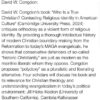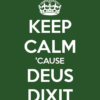Category: Evangelical Calvinist
Writings from the blog: Athanasian Reformed (aka The Evangelical Calvinist). Senior Reformed scholars present a coherent and impassioned articulation of Calvinism for today’s world.
An Apology for Reading Deep Theology, Beyond Nerdom
This is no secret: I read lots of what would be considered “academic theology.” The thing is, I don’t read it to be an academic, per se. The thought occurs to me that there are many out there who read and do theology for purely academic reasons. But you don’t have to. You can read academic theology simply to grow in the grace and knowledge of Jesus Christ; to be active in the sanctification process, as the Holy Spirit blows and kindles the fire of Christ’s love upon our new hearts of ‘flesh.’ It is true, some might mistake you…
Who Is a True Christian? And AAR
Dr. David Congdon has written a new book. Published by Cambridge University Press (2024), it is titled: Who Is a True Christian?: Contesting Religious Identity in American Culture. I have some history with ole’ Congdon, particularly from back in the good old days of the blogosphere. Anyway, his new book might sound provocative; but I don’t think it does, really. Congdon, these days, rejects the bodily resurrection of Jesus Christ; the bodily return of Jesus Christ; a conscious afterlife (eschatological life), so on and so forth. With these identifiable positions, what in God’s green earth qualifies someone like Congdon to…
On Being the Listening Church: How Dialectical Theology, Properly Understood, is Dialogical Theology
What is dialectical theology? Barth is often referred to as a dialectical theologian; especially the earlier Barth. Some want to implicitly criticize Barth by asserting that because Barth was a dialectical theologian, he, eo ipso was a Hegelianizing theologian (i.e., putting Hegel’s dialectic to work for his theologizing). And yet, Barth is much more original than that. He was clearly a modern theologian, as is anyone who currently does theology in the 21st century. Even so, his methodology was to allow Holy Scripture and its reality in Jesus Christ to regulate his deployment of any other mechanisms he might have…
Bad Perceptions versus God’s Perceptions in a Culture Awash in Self-worship
Perceptions don’t dictate the truth, per se. The truth is the truth without contingence upon our relative perceptions. Perceptions might dictate a variety of things in society writ large, but never the truth, per se. Perceptions are really and only self-projections of our dispositions and their forming pressures, as those have developed in our personal circumstances and experiences in the world. Nevertheless, we aren’t slavishly trapped within our perceptions, per se. But our only hope is to come to participate in the extra life of God; and begin to grow in the grace and knowledge of Jesus Christ. This way…
God’s Theologian for the World: A Picture
What a true theologian looks like; God’s theologian for the world. The theologian’s posture doing the will of the Father. Vasily Perov circa 1878 Athanasian Reformed
A Brief Soliloquy on the Phantom of the Lesser of Evils
The “lesser of two evils”–on a slippery slope–reduces to utter chaos and travail. At some point on that slope, the Christian in particular, must step off before oblivion hits. At some point the realization must hit that within the current framework–whatever that is at the time–there must be a “redline,” which indicates that the most prudent thing to do is to jump off the slippery slope onto the solid ground of Christ’s kingdom. Canaan kept devolving, devolving, devolving, and on the logic of the “lesser of two evils” Christians would continue on with compromising, compromising, compromising, to the point that…
The Bible’s Meaning as Near as Your Next Prayer: On a Biblical Hermeneutics
For some reason there are many Christians, through the centuries even, who want to make an attempt at reading Holy Scripture without reading it from its God-given context in Jesus Christ. That is to say, there are Christians who want to read the Bible from a christologically contextless frame wherein the Bible becomes a wax-nose given shape by their wits and capacity to marshal the latest reading strategies of the day. But the Bible isn’t a book like that. It isn’t open to naturalist or immanentist frames of reference. It has its whole and its parts altogether, in regard to…
On Living the ‘Confessional Life’ from the Life at the Right Hand
Being a confessional Christian is the way. Some might read this and think I am referring to being ‘Reformed.’ But that would be mistaken; the Reformed might think they have a corner on this language, but they don’t. What I mean when I say ‘confessional’ is being a Christian in the Christian existence who lives and breathes and does theology based on the confession that Jesus is Lord. Doing theology based on the premise that God has spoken (‘Deus dixit’), and only after that fact, that reality can a genuinely Christian theology obtain. Being confessional is to live life in…
My Exchange with an ‘Orthobro’: Addressing the spirit of Sectarianism
I just recently had an exchange on X with a type of guy who is often referred to as an “Orthobro,” short for “Orthodox brother,” but with a “dude” edge. I am not going to use his name, which to his credit he actually uses his (real name) on X. But he is a recent convert from Anglicanism (as an ordinand for the ministry) to the Eastern Orthodox church (where he will be soon, apparently, also an ordinand). As you will notice, only by inference, I would suggest that he is still in the so-called “cage-stage.” Often this terminology is…
“The kingdom of His beloved Son”: On the Non-dualist Reality of the Kingdom
“For He rescued us from the domain of darkness, and transferred us to the kingdom of His beloved Son, …” Colossians 1:13 Do you see how this is not a dualistic scheme—like light versus darkness, good versus evil? Christianity does not operate in a dualistic frame of reference. It presents the world and the church with the fact that everything in relation to God in Christ is asymmetrical; and asymmetrical in a way where there is no comparison between who He has offered for Himself in the eternal Son become flesh in Jesus Christ, and every other thing in this…







